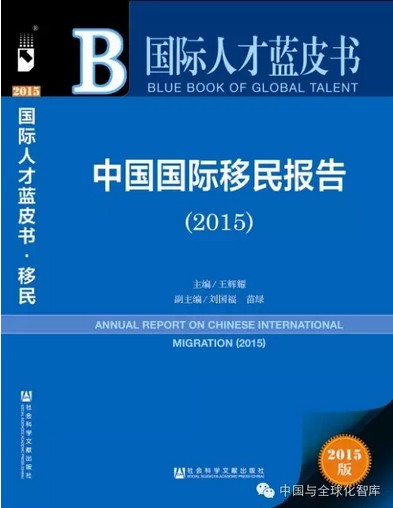【中国网】Think tank: China should develop its ’immigration bonus’
2015年3月23日
From China.org.cn
Developed countries have benefited greatly from immigration, so China should also do more to develop its own “immigration bonus,” according to a think tank report released Thursday in Beijing.
The “Annual Report on Chinese International Migration (2015)” was issued by the Center for China and Globalization, one of China’s leading independent global think tanks.
The report points out that immigrants will make great contributions to a country’s economy if the country has a relatively high proportion of immigrants.
According to statistics from Singapore’s Ministry of Trade and Industry, immigrants contributed 41 percent of its GDP in the 1990s.

Similar benefits can be found in the United States, where a large number of immigrants flow in every year, bringing with them professional skills, capital, culture and human resources that greatly stimulate the development of the economy and society, CCG’s research found. The report reveals that immigrants in the United States have become indispensable to the progress of scientific research in the country. Although only 14 percent of the total population of the United States was born in foreign countries, immigrants have contributed one-third of all the country’s innovation patents, and 42 percent of researchers at the country’s seven leading cancer research centers were born in other countries.“
The U.N. estimated that around 848,500 foreign people lived in China in 2013, which accounted for only 0.06 percent of the total Chinese population. This figure was the lowest in the world. The average figure for developed countries and regions is 10.8 percent, 3.2 percent for the whole world, 1.6 percent for developing countries and 1.2 percent for the least-developed countries,” said Dr. Wang Huiyao, founder and president of the CCG, which focuses on China’s globalization strategy.
The CCG advised that the mobility of foreigners in China should be improved. A total of 52.51 million inbound and outbound foreign personnel entered or exited China in 2013, a decrease of about 3 percent from the 54.35 million that traveled to and from the country in 2012. In contrast, China saw 195 million inbound and outbound mainland Chinese in 2013, an increase of 106 percent over the 94.91 million in 2009. This number was also 3.7 times higher than the number of inbound and outbound foreigners in 2013.
Over the past 30 years, China has benefited from a demographic bonus — a floating population of about 200 million migrant workers — by gradually removing obstacles that hindered internal population movement, particularly some aspects of the household registration system. The report advises that as China becomes a more and more attractive international immigration destination, the country should further stimulate the mobility of international talents and develop its own global “immigration bonus” to boost national development over the next 30 years.
While the report also warns of the risk that immigrants (including a large number of undocumented immigrants from Africa) will pose a challenge to China’s urban management, social stability and safety, it also confidently asserts that these immigrants will simultaneously help develop China’s economy. The report asserts that China can face these challenges successfully.
Though China is not a fully developed country, China’s peaceful rise will surely attract more and more immigrants from poor countries, the report says.






